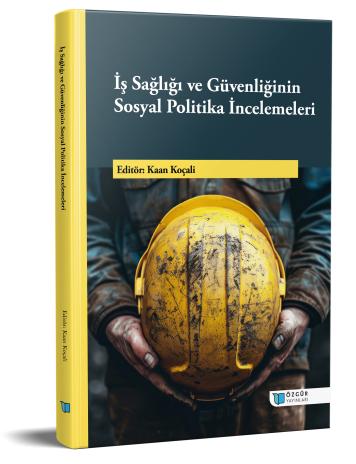
Work Accidents and the Protective and Preventive Role of the Social Security System in Türkiye
Chapter from the book:
Koçali,
K.
(ed.)
2025.
Social Policy Reviews of Occupational Health and Safety.
Synopsis
This section comprehensively examines the position of occupational accidents in Türkiye within the context of the social security system, their legal regulations and their multidimensional effects. Beyond the health and life losses experienced solely at the individual level, occupational accidents are considered as a social phenomenon that has far-reaching consequences at economic, social, legal and institutional levels. While international and national statistics provide important data in terms of the frequency of occupational accidents and the damages they cause, it is observed that structural problems regarding the prevention of occupational accidents continue in Turkey despite the existing legal and institutional infrastructure. This situation indicates that there are significant deficiencies in the effective implementation of legislative regulations and the holistic operation of the system.
First, the study examines the historical development and institutional structure of the Turkish social security system, and reveals the protective function of the system against occupational accidents and occupational diseases. The basic components of the Social Insurance and General Health Insurance Law No. 5510, such as insurance types, short-term and long-term insurance branches, and premium collection, are analyzed in detail. Thus, the legal definition of occupational accidents and their position within the social security system are evaluated in depth from legal and institutional perspectives. A significant portion of the chapter is devoted to examining the scope of the concept of occupational accident and basic legal principles such as causality, the principle of inevitability and the distribution of responsibilities in light of court decisions on occupational accidents. Within this framework, the cause-effect relationship between occupational accidents and the damages that occur and how the boundaries of responsibility between employers, insured and third parties are drawn are comprehensively addressed. The inconsistencies between legislation and practice as well as the sharing of duties between institutions in the detection of occupational accidents, notification obligations and audit processes are also discussed in detail. The roles of the employer, insured and third parties in terms of legal and financial liabilities and the effects of these roles on the social security system are explained within an academic framework. In particular, the employer's compensation obligations in cases of fault and negligence, the effect of the insured's gross fault and non-compliance with the treatment process on social security benefits and the recourse liability of third parties to the SSI in proportion to their fault are examined in detail. The chapter also addresses the economic and social effects of occupational accidents from a multidimensional perspective. While evaluating the consequences of accidents such as physical health and income loss, psychological trauma and deterioration in social relations from the perspective of the insured; The focus is on production losses, administrative fines, the burden of legal processes and corporate reputation damages for the employer. In terms of the state and public institutions, the financial burden of occupational accidents on the social security system, the increasing demand for health services and the workload-increasing effects on the judicial system are analyzed. In addition, problems such as the reduction of the visibility of occupational accidents and the deterioration of the financial balance caused by unregistered employment are also addressed.
Finally, the section presents policy recommendations such as simplifying the legislation, increasing the audit capacity, activating digitalization processes, combating informality and strengthening incentives for small and medium-sized enterprises. These recommendations are of critical importance both in terms of effectively preventing occupational accidents and ensuring the financial and structural sustainability of the social security system. The findings of the study emphasize the need for a holistic approach in the field of occupational health and safety; and point to the importance of restructuring the social security system as a preventive, regulatory and educational structure, rather than being a mere compensation mechanism.

